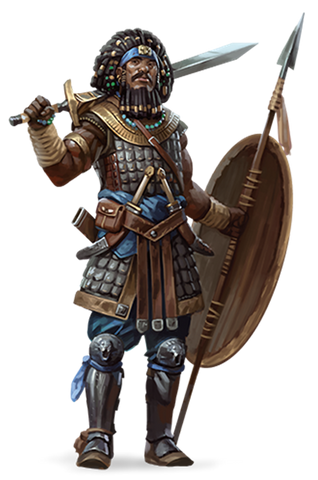Congratulations this is both the biggest opportunity and the biggest burden in all of Dungeons and Dragons. You’re the DM and you have a brand-new player. I call it a burden because their opinion of the game will forever be compared to how you run the game. This is where they develop their opinion on roleplaying. It’s also a great opportunity for the same reasons. It’s a great opportunity to introduce a whole new world to someone. You have a chance to get someone excited about Dungeons and Dragons. Never forget, what makes this game so compelling is the life experiences of new players adding a new flavor to the hobby. D&D will always need more players because it makes the game better.
So what do you do? How do you get a new player interested? How do you introduce them to the game without too much hand-holding? How do you get them into the game without flat-out telling them what moves to make? Let’s start with the basics. Character creation. Most people will tell you that the fun is in creating a unique character and going on their adventures. I’d agree with that. The problem is with new players, they won’t know how to create a character. Some people just want to sit down and play. That’s how they will figure out if it’s a game they want to play. That’s where pre-generated characters come in. Having a backup list of character sheets ready to go is more valuable than you might think. For one, it won’t be their character. This sounds like a negative but think about it a little. What if that character gets killed? If it’s a character a new player created and was excited to play, it’s heartbreaking that they won’t get to play it. If it’s a pre-generated character, it won’t be as painful if that character dies. If they like it and wish to continue, just re-skin that pre-generated character.
With that in mind, the second point for DMs is to have a backup plan.

Any DM will have backup plans anyway, but there needs to be ones specifically for new players. D&D is all improvised so that things can go off the rails at any point. That’s D&D. They tend to be the best stories. But with a new player, they just aren’t going to be as confident to offer off-the-wall suggestions. They need to be prodded to do something unexpected. If they don’t, what do you do? No player likes to sit there for an hour trying to solve some puzzle. DMs will need to have some kind of plan to offer clues to new players when they get stuck. Don’t let them sit there for too long. Keep the story going.
Go easy on new players. Certainly don’t throw new players into high-level play. I’d personally recommend levels 1 to 3. New players will need time to get comfortable with their character. Some classes are harder to play than others. They all need time to figure out the way they play. They might not fight their first dragon in their very first game, but that’s not a bad thing. Have something to look forward to.
When in the game, it’s important to explain the situation. D&D can get overwhelming. The initial reaction is to charge head-first at every monster swinging your sword. Let new players know that it might be a smarter idea to change up their tactics. Understand their surroundings. How many new players would know to throw a chair at someone to set up advantage for another player? How many new players would ever think that running away is always an option? These thoughts might not occur because they come into D&D thinking it’s like a video game. They might think that an adult blue dragon is at the appropriate challenge level for a level 1 character because they happened to see one fly overhead.
Throughout the game, DMs will need to emphasize that actions have consequences. It’s so tempting to roll into Waterdeep and just start smashing the heads of some unscrupulous people. The problem with that strategy is that they’re in Waterdeep. Laws exist. And so do city guards. And civilians just trying to live out their meager lives. If players decide to attack someone in the streets, the people of Waterdeep might not take too kindly to that. Talk with new players before they do something rash. Make sure that they really want to steal that purse off that noble.
Please emphasize freedom of play. The DM isn’t there to say no. They are there to be the referee. It’s called the “rule of cool” for a reason. If a player gets a bolt of inspiration and comes up with a way to use their comrade as an improvised weapon, let it happen. Naturally, there would be consequences. Of course. Increase the AC. Lower the potential damage. Have them sacrifice some hit points. That’s all well and good. But encourage creativity. That’s the heart of D&D. Be creative because you’re all telling this story together.
Above all else, be patient. It’s going to be a learning curve. The players will

ask a lot of questions. They won’t know what to roll. Point out what all the numbers mean. It will be a learning experience for you as the DM as well. Chances are you were a new player at one time. It’s quite another experience to go from a student to a teacher. Embrace that mindset. You’re teaching someone about something you are passionate about. Someone did that for you once, it’s time to pay it forward. Always remember, D&D as well as life in general, is full of new experiences and wonders to explore.




